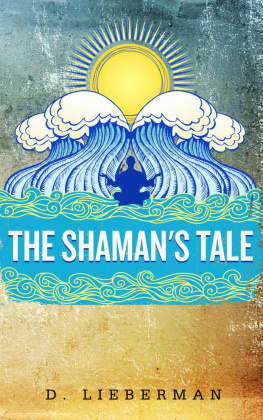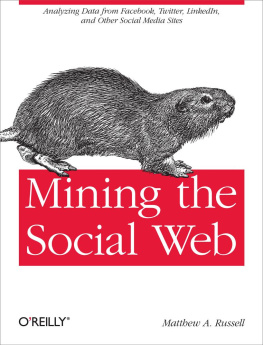Matthew D. Lieberman - Social
Here you can read online Matthew D. Lieberman - Social full text of the book (entire story) in english for free. Download pdf and epub, get meaning, cover and reviews about this ebook. year: 2013, publisher: Oxford University Press, genre: Religion. Description of the work, (preface) as well as reviews are available. Best literature library LitArk.com created for fans of good reading and offers a wide selection of genres:
Romance novel
Science fiction
Adventure
Detective
Science
History
Home and family
Prose
Art
Politics
Computer
Non-fiction
Religion
Business
Children
Humor
Choose a favorite category and find really read worthwhile books. Enjoy immersion in the world of imagination, feel the emotions of the characters or learn something new for yourself, make an fascinating discovery.

- Book:Social
- Author:
- Publisher:Oxford University Press
- Genre:
- Year:2013
- Rating:4 / 5
- Favourites:Add to favourites
- Your mark:
- 80
- 1
- 2
- 3
- 4
- 5
Social: summary, description and annotation
We offer to read an annotation, description, summary or preface (depends on what the author of the book "Social" wrote himself). If you haven't found the necessary information about the book — write in the comments, we will try to find it.
Social — read online for free the complete book (whole text) full work
Below is the text of the book, divided by pages. System saving the place of the last page read, allows you to conveniently read the book "Social" online for free, without having to search again every time where you left off. Put a bookmark, and you can go to the page where you finished reading at any time.
Font size:
Interval:
Bookmark:
Social
Social
Why Our Brains Are Wired to Connect
Matthew D. Lieberman


Great Clarendon Street, Oxford, OX2 6DP,
United Kingdom
Oxford University Press is a department of the University of Oxford. It furthers the Universitys objective of excellence in research, scholarship, and education by publishing worldwide. Oxford is a registered trade mark of Oxford University Press in the UK and in certain other countries
Matthew D. Lieberman 2013
Illustrations credits: Fred Haynes ( )
The moral rights of the author have been asserted
First Edition published in 2013
Impression: 1
All rights reserved. No part of this publication may be reproduced, stored in a retrieval system, or transmitted, in any form or by any means, without the prior permission in writing of Oxford University Press, or as expressly permitted by law, by licence or under terms agreed with the appropriate reprographics rights organization. Enquiries concerning reproduction outside the scope of the above should be sent to the Rights Department, Oxford University Press, at the address above
You must not circulate this work in any other form and you must impose this same condition on any acquirer
British Library Cataloguing in Publication Data
Data available
Library of Congress Control Number: 2013947875
ISBN 9780199645046
Printed in Great Britain by Clays Ltd, St Ives plc
For Naomi and Ian,
who showed me what my social brain was for
CONTENTS
C enturies ago, the philosopher Jeremy Bentham wrote, Pain and pleasure govern us in all we do, in all we say, in all we think. There is little doubt that we are drawn to physical pleasure and work hard to avoid physical pain. But do they govern us in all we do? Is this all that we are? I think they govern us far less than we typically assume. The institutions and incentive structures of society operate largely in accordance with Benthams claim and thus are missing out on some of the most profound motivators of human behavior.
What Bentham and the rest of us typically overlook is that humans are wired with another set of interests that are just as basic as physical pain and pleasure. We are wired to be social. We are driven by deep motivations to stay connected with friends and family. We are naturally curious about what is going on in the minds of other people. And our identities are formed by the values lent to us from the groups we call our own. These connections lead to strange behaviors that violate our expectation of rational self-interest and make sense only if our social nature is taken as a starting point for who we are.
Over the past two decades, my colleagues and I have created a new kind of science called social cognitive neuroscience . Using tools like functional magnetic resonance imaging (fMRI), we have made startling discoveries of how the human brain responds to the social worlddiscoveries that were not possible before. These findings repeatedly reinforce the conclusion that our brains are wired to connect with other people. Some parts of the social mind can be traced back to the earliest mammals hundreds of millions of years ago. Other parts of the social mind evolved very recently and may be unique to humans. Understanding how these mental mechanisms drive our behavior is critical to improving the lives of individuals and organizations. This book will illuminate the neural mechanisms of the social mind and how they relate to making the most of our social lives.
Part One
Beginnings
CHAPTER 1
Who Are We?
I rv and Gloria lived the American dream for more than half a century. Depression-era children, they lifted themselves up from humble beginnings to become the toast of Atlantic City. They met when they were barely teens and spent their high school years going steady. Irv was admitted to Duke University, but then he signed up to serve his country as a naval pilot in World War II. When he went off to training camp, Gloria went with him. They were married just after the war and gave birth to two baby boomers who went on to become successful lawyers. Irv built the house he and Gloria lived in with his own hands. Later, he worked in real estate, and Gloria worked in his office with him. They had a knack for the business, and it didnt hurt that they had been savvy enough to purchase a few parking lots that the emerging casino industry would later want to snatch up. Irv and Gloria were inseparable. They lived, worked, and vacationed together.
At the age of sixty-seven, Irv learned that he had advanced prostate cancer, and he died soon after. Irvs death was a devastating blow to Gloria. People deal with tremendous adversity all the time and find ways to move on, but Gloria never did. She spent the rest of her days fixated on the loss of her partner, while her mind and memory slowly deteriorated. Over time, she became a different person. Before, she had always been charming and witty, if somewhat of a worrier. After Irvs passing, she became self-centered, inattentive, and even mean-spirited at times.
Glorias friends wondered what had happened to her as they abandoned her one by one. Family struggled to put up with her moods and behavior. Most of the explanations offered for the changes she had undergone focused on neurobiology. Maybe she had some form of Alzheimers disease or dementia? But nothing really supported such a diagnosis other than her growing memory loss. Some asked whether the medication she was taking to deal with her acute grief had left her with long-term neurological damage. Gloria, however, did not ponder such questions. She knew what was wrongshe would rather have died than live another day without Irv. I know this because she told me every chance she got. She was my grandmother. In her mind, she was dying of a broken heart. Years later, when I asked my father what had led her to change so radically, he said, She died the moment he died. She didnt have a happy moment after.
Font size:
Interval:
Bookmark:
Similar books «Social»
Look at similar books to Social. We have selected literature similar in name and meaning in the hope of providing readers with more options to find new, interesting, not yet read works.
Discussion, reviews of the book Social and just readers' own opinions. Leave your comments, write what you think about the work, its meaning or the main characters. Specify what exactly you liked and what you didn't like, and why you think so.









